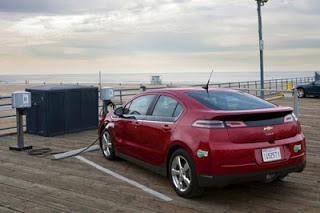Earlier this week Climate Change Skeptic Bjorn Lomborg wrote an opinion piece in the Wall Street Journal that’s one of these bash-the-electric-cars hit pieces![]() that come along every so often. The piece has a number of holes in it, and in a TorqueNews piece
that come along every so often. The piece has a number of holes in it, and in a TorqueNews piece![]() I went over a response published by the Electric Drive Transportation Association
I went over a response published by the Electric Drive Transportation Association![]() which showed his math to be fuzzy and logic to be weak.
which showed his math to be fuzzy and logic to be weak.
The key part of Lomborg’s piece is a 2012 study published in the Journal of Industrial Ecology![]() . That study claimed, according to Lomborg, that electric cars have a much larger manufacturing intensity than do comparable gasoline powered cars. That outsized manufacturing intensity means electric cars start off their life with a greater environmental impact than gasoline cars, that must be made up for by environmental gains during the life of the car. But because of various limitations of electric cars Lomborg claims they won’t be driven very much, which will limit the environmental gains.
. That study claimed, according to Lomborg, that electric cars have a much larger manufacturing intensity than do comparable gasoline powered cars. That outsized manufacturing intensity means electric cars start off their life with a greater environmental impact than gasoline cars, that must be made up for by environmental gains during the life of the car. But because of various limitations of electric cars Lomborg claims they won’t be driven very much, which will limit the environmental gains.
The EDTA response showed his reasoning was extremely flawed and the numbers he used were just plain wrong.
Media Matters![]() also went over his piece, and cited a number of experts making the same points as the EDTA made.
also went over his piece, and cited a number of experts making the same points as the EDTA made.
Media Matters quotes University of California at Los Angeles’ Dr. Deepak Rajagopal as saying the JIE study cited by Lomborg assumed electric vehicles would see 100,000 miles of use, rather than the 50,000 claimed by Lomborg.

![]() Natural Resources Defense Council’s Max Baumherner noted
Natural Resources Defense Council’s Max Baumherner noted![]() that the JIE study’s estimates of manufacturing intensity is three times higher than those of the Argonne National Laboratory. (GREET Lifecycle Model
that the JIE study’s estimates of manufacturing intensity is three times higher than those of the Argonne National Laboratory. (GREET Lifecycle Model![]() )
)
David Friedman writing on the the Union of Concerned Scientists![]() blog added that “Bjorn Lomborg, has a history of selectively using information to fit his
blog added that “Bjorn Lomborg, has a history of selectively using information to fit his
opinion rather than allowing his opinion to be shaped by all the facts.” In this case he relies on “an outlier study that estimates that EV manufacturing emissions are twice those of gasoline cars,” using that distortion as the basis for his bashing of electric cars.
My take is that the focus on greenhouse gas emissions as the sole benchmark to gauge the effectiveness of electric cars is itself bogus. The whole debate above is focused on whether electric cars have a smaller greenhouse gas impact. This is an important goal, and the numbers do show that electric vehicles have a much better greenhouse gas impact, but that should not be the sole focus of electric vehicle adoption. To make that the sole focus misses other big issues that need to be solved.
Here’s a few
Geopolitical nonsense such as unnecessary wars of choice to control access to fossil oil supplies
Ecological disasters such as mountain top destruction, strip mining of vast areas to get tar sands, the hydraulic fracturing thing, oil platform explosions, and more that are side effects of the fossil fuel industry
Noise pollution in cities
Other non-greenhouse gas environmental impacts of fossil fuel mining, transportation, processing and consumption
The risk of Peak Oil on the survivability of modern society
Land use nightmare that modern highways are
The lack of walkable neighborhoods and cities (in the U.S.)
Electric cars don’t solve some of these issues – the last two in particular. But they do have the potential to greatly influence the rest of the issues.
- Highway design could decrease death and injury risk, if “we” chose smarter designs - March 28, 2015
- GM really did trademark “range anxiety”, only later to abandon that mark - March 25, 2015
- US Government releases new regulations on hydraulic fracturing, that some call “toothless” - March 20, 2015
- Tesla Motors magic pill to solve range anxiety doesn’t quite instill range confidence - March 19, 2015
- Update on Galena IL oil train – 21 cars involved, which were the supposedly safer CP1232 design - March 7, 2015
- Another oil bomb train – why are they shipping crude oil by train? – Symptoms of fossil fuel addiction - March 6, 2015
- Chevron relinquishes fracking in Romania, as part of broader pull-out from Eastern European fracking operations - February 22, 2015
- Answer anti- electric car articles with truth and pride – truth outshines all distortions - February 19, 2015
- Apple taking big risk on developing a car? Please, Apple, don’t go there! - February 16, 2015
- Toyota, Nissan, Honda working on Japanese fuel cell infrastructure for Japanese government - February 12, 2015














